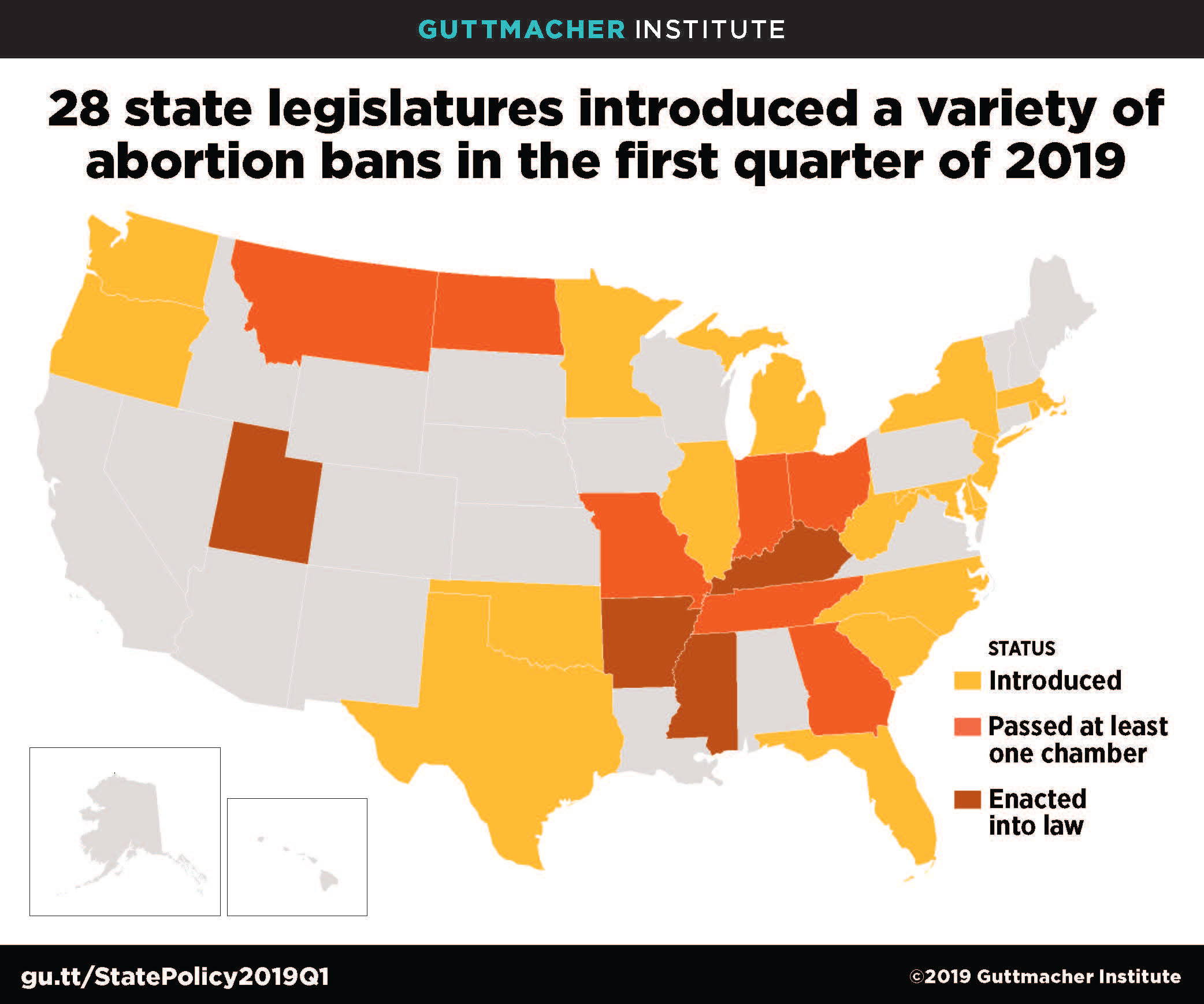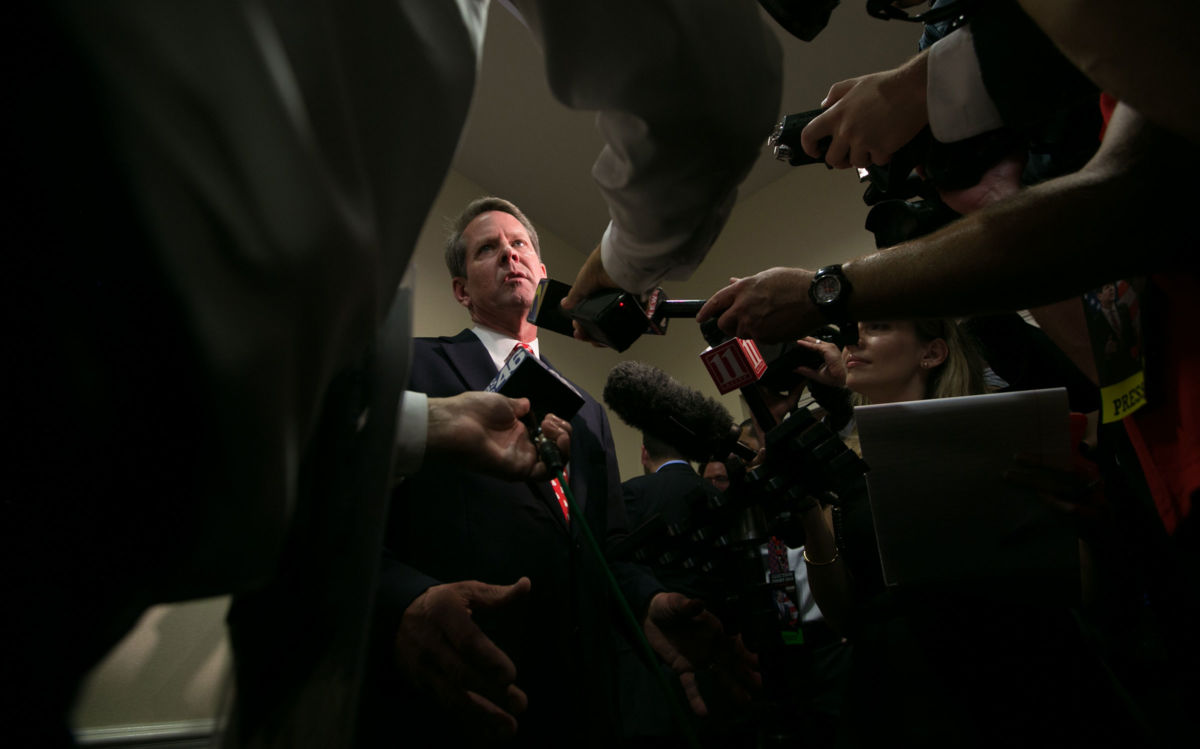Honest, paywall-free news is rare. Please support our boldly independent journalism with a donation of any size.
Statehouse activities in the first quarter of 2019 have shown an increased boldness on the part of openly anti-abortion legislators, culminating this month with Georgia’s “heartbeat bill,” which would criminalize abortion at six weeks. Maligned Gov. Brian Kemp has vowed to sign it before the May 1 deadline.
“These last few months, Governor Kemp and the extreme GOP in Georgia have made their priorities crystal clear—they have shown that they have no plans to solve the real problems facing Georgians, and instead, they used this session to further their obsession with stripping away our rights,” NARAL Pro-Choice Georgia State Director Laura Simmons said on a press call. “To be clear: HB 481 is a complete rejection of the values Georgians hold.”
The speciously titled “Living Infants Fairness and Equality (LIFE) Act,” HB 481, passed by a singular vote despite polling from March showing that 69 percent of Georgians — including 52 percent of Republicans — support legal abortion. In fact, 56 percent of Georgia voters say they are less likely to vote for their elected officials in the next election if they support legislation to criminalize abortion. With statistics like these, it’s hard to imagine much backing for a law that preempts access to abortion before most patients even realize they’ve missed a period and might be pregnant.
“Just so we’re clear: Abortion care is health care,” Dr. Atsuko Koyama said on the NARAL-organized press call. “As a provider of abortion care, I know that patients of every gender, age, race, religion, sexual identity and zip code need access to this safe, effective care. Georgia’s impending ban on almost all abortion care will endanger women and families both here and in surrounding states, while criminalizing physicians like me who are trying to provide compassionate, comprehensive health care for patients.”
Koyama has reason to be concerned about patients beyond the borders of her state; this year’s newly introduced and enacted abortion bans are hitting the southeast U.S. particularly hard.

From the western borders of Arkansas and Louisiana to the eastern borders of the Carolinas and Georgia (a nearly 1,200-mile stretch), advocates already had their hands full with ongoing legal challenges from last year’s unconstitutional bills. States like Arkansas and Mississippi continue to be at risk of losing their only provider and/or clinic, and the few remaining in Alabama would be shuttered if HB 314 makes its way to staunchly anti-choice Gov. Kay Ivy.
The expanse of western Texas may be the most well-known “abortion desert” in the U.S., but the landscape across the rest of the South is in danger of catching up. As the Guttmacher Institute — a non-partisan sexual health research nonprofit — lays out in its most current analysis of state-based abortion laws, the layering of multiple restrictions is putting abortion care further and further out of reach. Guttmacher characterizes the 304 proposed restrictions that kicked off the legislative calendars in 28 states, with a dangerous concentration between Texas and Florida, as “radical attempts to ban abortion.” While the total number proposed may be on par with the new normal, 2019 activity shows an “increasingly radical and dangerous” new focus: “Indeed, anti-abortion policy makers wasted no time revealing their true agenda: banning abortion.”
These restrictions range from “trigger bans” that criminalize abortion automatically should Roe v. Wade be nullified, gestational age bans prohibiting abortion past a certain point in pregnancy, “reason bans” outlawing abortion based on characteristics of the fetus (sex, race, potential disability), and “method bans” that shirk accepted science and best medical practices by prohibiting specific, common and safe procedures.
Six-week bans, or “heartbeat bans” as anti-choice legislators designate them, are all the rage and, according to Guttmacher, they share more than just a misleading title. Their “true agenda” is putting an end to legal abortion altogether. First introduced in Ohio in 2011, enacted by North Dakota in 2013 and Iowa in 2018, none of the existing iterations has withstood legal challenges. Losing attempts to defend these laws are expensive and the cost is passed onto the state’s residents whether or not there is public support. Mississippi is facing a possible $1 million or more in legal fees over just a few short years; Indiana has dumped $2,831,532.99 in legal fees to the ACLU since 2011, as the losing party is required to cover costs incurred by the winning party; and North Dakota — already facing a $1 billion budget shortfall — fell further behind after racking up $491,016 in legal costs (so far) while defending its own version of the heartbeat ban.
Alabama State Rep. Terri Collins openly concedes that the legislation she introduced the day after Georgia’s bill passed — HB 314, which would make abortion a Class A felony with no exceptions for rape or incest — would result in similarly expensive challenges.
“We think this is the bill that could overturn what I consider to be a bad law [Roe v. Wade],” local CBS-affiliate WHNT reports Collins saying. “[I]t’s well worth spending the money.”
In many of these states, that money would be better spent on addressing maternal mortality rates that should be a national embarrassment. Georgia, in particular, is in the midst of a crisis.
“As we speak — Georgia has one of the worst maternal death rates in the nation. And the most recent data indicates that black women are almost three times more likely to die from childbirth than white women are. This is morally outrageous,” Andrea Young, executive director of the ACLU of Georgia, said in a press release. “The proposed legislation – HB 481 – represents a callous disregard for their health and wellness and contempt for the Constitutional Rights of Georgia’s women. If this bill becomes law, it will be challenged. We will see you in court.”
Young isn’t overstating the situation. In 2010, Amnesty International singled out Georgia as the U.S. state with the worst maternal mortality rate. The Global Health Justice Partnership (GHJP) at Yale University released a report in February 2018 titled “When the State Fails: Maternal Mortality and Racial Disparity in Georgia” in collaboration with the Black Mamas Matter Alliance and the Center for Reproductive Rights. Despite international rates showing across-the-board declines — including in countries classified as “least developed” by the U.N., the state of Georgia is hovering at 40.8 deaths per 100,000 live births. When these numbers are broken down further, the racial disparity is striking: 27.1 deaths per 100,000 live births for white women and 62.1 for Black women.
According to the GHJP report, Georgia fails in specific systemic ways: “access to and quality of care, health insurance access and pricing, funding for maternal health, and accountability around data analysis and use, specifically with regards to the state’s maternal mortality review committee (MMRC).”
GHJP clinical fellow Poonam Daryani summarized some of the contributing factors in the report, saying, “Failures in care can arise at institutional levels, such as poorly performing hospitals serving predominantly Black patients, and also at interpersonal levels—such as providers who dismiss and neglect to respond appropriately to patient concerns.”
Kwajelyn J. Jackson, member of the Steering Committee for the Black Mamas Matter Alliance and community education and advocacy director at Atlanta’s Feminist Women’s Health Center, added historical context to the institutional failures in her contribution to the GHJP report:
So often the state level solutions that are recommended are focused on individual behavior change rather than examining the systemic failures that contribute to and exacerbate the racial disparity … What we hope that policymakers will take from this report is the imperative call to make a real investment in Black women’s holistic care and implement state and federal policies that promote affordable, comprehensive, and accessible maternal health care that is free of gender and racial discrimination and informed by the lived experiences of Black women.
The passing of HB 481 has made it clear that so-called “pro-life” legislators and other policymakers in Jackson’s state are, instead, prioritizing attempts to ban exceptionally safe abortion procedures while Georgians die unnecessarily from a lack of access to basic care. Chief among those with dangerously misaligned priorities is Governor Kemp, who outlined his plans during the campaign against Stacey Abrams: “We advance pro-life legislation, battle in the courtroom, and wait on the Supreme Court to overturn Roe v. Wade.”
The intention behind these bills has always been to eventually succeed in challenging the precedent set by Roe in 1973. What’s new is the proud, public admission that they’re coming for the constitutional rights of everyone living inside the U.S.
Oriaku Njoku, executive director and co-founder of Access Reproductive Care-Southeast — an Atlanta-based abortion fund serving Alabama, Florida, Georgia, Mississippi, South Carolina and Tennessee — spoke with Truthout about the onslaught of “heartbeat bills” and total bans.
“Georgia’s ban and the ban under consideration in Alabama are part of a calculated national strategy by anti-abortion politicians to eliminate access to care entirely,” said Njoku. “Restrictions that ban abortion before someone even knows they’re pregnant and total abortion bans not only impact our communities, but create a culture and climate that shames and stigmatizes pregnant people. Our bodies and lives are not political pawns. And yet, here we are in 2019 having to prove that we deserve to be treated with dignity and respect.”
Speaking against the authoritarian crackdown
In the midst of a nationwide attack on civil liberties, Truthout urgently needs your help.
Journalism is a critical tool in the fight against Trump and his extremist agenda. The right wing knows this — that’s why they’ve taken over many legacy media publications.
But we won’t let truth be replaced by propaganda. As the Trump administration works to silence dissent, please support nonprofit independent journalism. Truthout is almost entirely funded by individual giving, so a one-time or monthly donation goes a long way. Click below to sustain our work.
